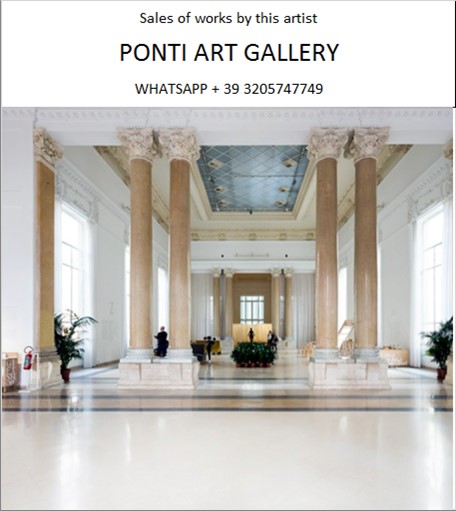Ponti Art Gallery is interested in buying and selling works
of art by this artist.

Eugenio Miccini Biography
Eugenio Miccini was an Italian artist and writer, born in Florence in 1925, whose work has left an indelible mark on the landscape of visual poetry. His journey began in a seminary where he was intended to become a priest, but his life took a different turn as he delved into humanistic studies, developing a passion for Greek philosophy and Latin literature. This early education laid the foundation for his later work, which would be characterized by a deep engagement with language and semiotics.
Miccini's artistic and literary pursuits were interrupted by World War II, during which he joined the partisans after leaving the seminary. Post-war, his philosophical interests were rekindled through the teachings of Giulio Preti, who introduced him to the theories of Hegel, Marx, and Dewey. These influences would later permeate his work, which often explored the intersection of art, language, and politics.
After the war, Miccini completed his education, earning a degree in Pedagogy. His academic pursuits did not stop him from engaging in literary activism. He contributed to various magazines, such as "Quartiere" and "Letteratura," and in 1961, his poetic talents were recognized with the City of Florence poetry prize. This accolade spurred him to deepen his connections with prominent Florentine literary figures and to explore new forms of expression.
The early 1960s marked a significant turning point in Miccini's career. His initial forays into linear poetry evolved into experiments with visual poetry, a genre that would come to define his artistic legacy. In 1963, he co-founded Gruppo 70 with Lamberto Pignotti and Luciano Ori, after participating in the organization of Gruppo 63. Gruppo 70 was a collective of poets, musicians, and painters that coined the term "poesia visiva" (visual poetry), a form of art that emphasizes the image over the typographical text, creating compositions where words, images, signs, and figures are integrated seamlessly on a semantic level.
Miccini's work in visual poetry was prolific and influential. He organized shows, performances, and publications that showcased this new art form. In 1969, he founded the Centro Téchne in Florence, which became a hub for cultural and political debate, as well as a space for experimental theater. He also directed the center's magazine and smaller texts dedicated to visual poetry.
Throughout his career, Miccini was deeply involved in teaching, holding positions in semiotic disciplines at the Faculty of Architecture in Florence and teaching art history at fine art academies. His commitment to education was matched by his active participation in the art world. He was invited to prestigious exhibitions such as the Venice Biennale and the Rome Quadrennial and collaborated with international groups dedicated to visual poetry.
Miccini's works are characterized by their critical engagement with mass media and their exploration of the relationship between words and images. He sought to create a new language that could break free from the constraints of traditional textual expression, a language that could more accurately reflect the complexities of contemporary life. His visual poems often incorporated elements from newspapers, magazines, and other printed materials, repurposing them to create new meanings and commentaries on society.
Eugenio Miccini's contributions to the art world extended beyond his own creations. He curated exhibitions, edited books on contemporary art, and directed a series of contemporary poetry for the Edizioni del Centro Culturale Gino Baratta in Mantua. His work has been included in numerous public collections, such as the Museo della Pilotta in Parma, the Museum of Modern Art in New York, and the Stedelijk Museum in Amsterdam, among others.
Miccini's legacy is one of innovation and interdisciplinary exploration. He was a pioneer in visual poetry, a movement that sought to redefine the boundaries between art and language. His work continues to inspire artists and poets, and his influence can be seen in the way contemporary art engages with text and image. Eugenio Miccini passed away in Florence in 2007, but his vision and contributions to the world of visual poetry endure.
Eugenio Miccini Quotes and
Sales of Works
Ponti Art Gallery selects and deals with paintings by the
artist. Upon request, we provide free estimates and
evaluations, communicate prices, quotations, and current
market values.
If you are interested in BUYING or SELLING works by the
artist, contact us immediately.
If you wish to sell or receive an evaluation of the
works:
Send us a frontal photo of the painting, one of the back,
and one of the signature. Also, indicate the dimensions of
the work. Inform us about the purchase origin of the work
and any kind of available documentation (purchase
receipts, certificates of authenticity, publications). One
of our operators will respond to you on the same day. We
guarantee maximum confidentiality and extreme
professionalism.
If you wish to purchase works by the painter: Contact us
and let us know your request. We will inform you about the
available works. We also offer the possibility to
subscribe to our NEWSLETTER, through which you will be
informed at the beginning of each month about the latest
acquisitions of the art gallery.
You can send us pictures of the work:
